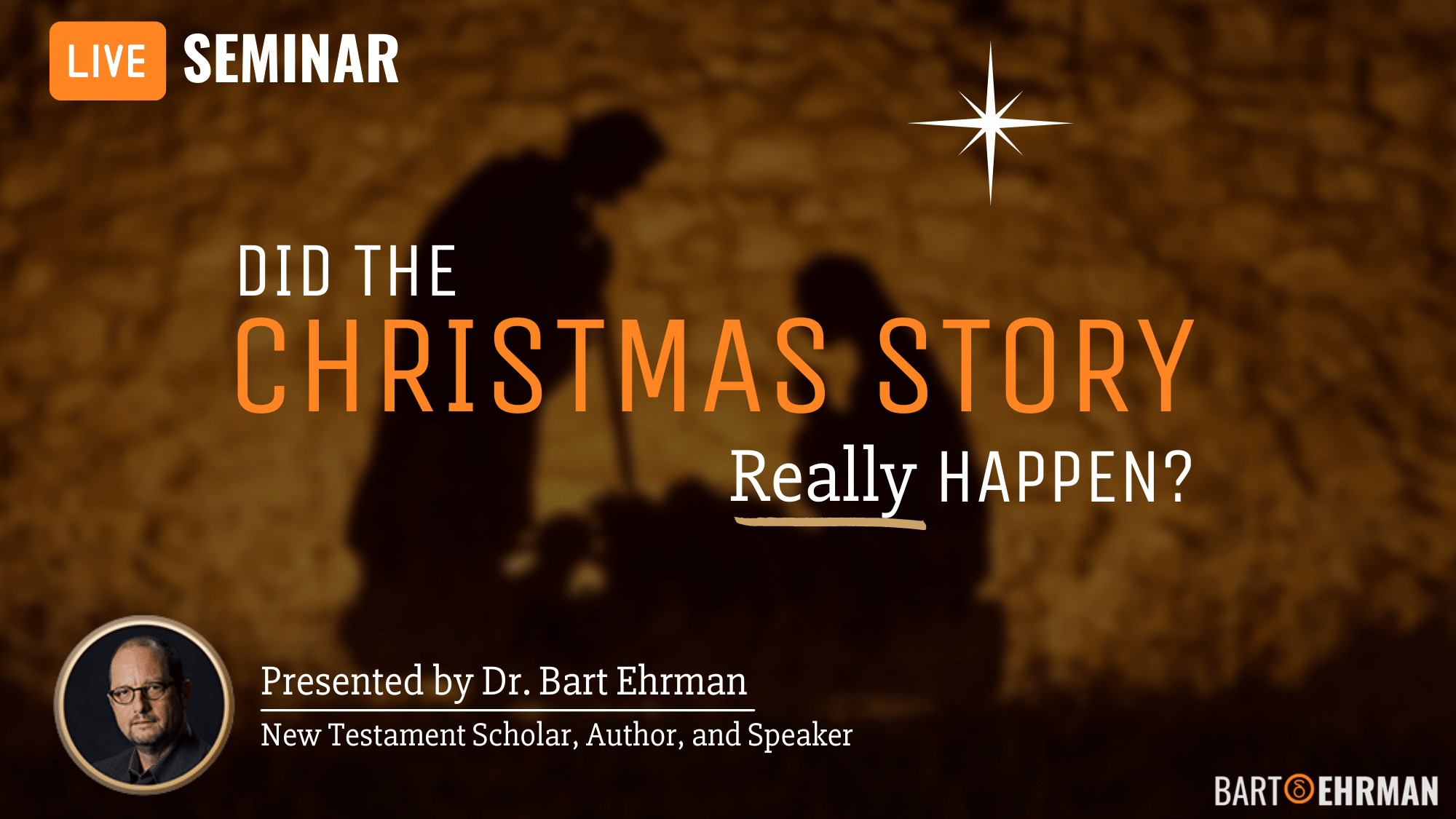Why is Christmas on December 25th? (Plus Jesus’ ACTUAL Birthday)

Written by Marko Marina, Ph.D.
Author | Historian
Author | Historian | BE Contributor
Verified! See our guidelines
Verified! See our editorial guidelines
Date written: December 12th, 2023
Disclaimer: The views and opinions expressed in this article belong to the author and do not necessarily match my own. - Dr. Bart D. Ehrman
Why is Christmas on December 25th? This question might seem straightforward at first glance, but it opens a fascinating window into the history of the ancient world. Millions of people around the world celebrate Jesus’ birth on December 25th - a date that has become synonymous with Christmas.
But why this particular day?
As we peel back the layers of history, we discover a story not just about a date, but about the evolution of culture, the spread of Christianity, and the human desire to find meaning in the depths of winter's darkness. Join me on a journey through time, as we explore the intriguing reasons behind why Christmas is celebrated on December 25th.
As we embark on this journey to understand why Christmas is celebrated on December 25th, let's delve even deeper into Jesus’ birth from a scholarly perspective. You don’t want to miss the enlightening webinar by renowned scholar Bart D. Ehrman. In “Jesus: The Actual Son of Joseph”. Dr. Ehrman offers an expert's view into the scholarly perspective on Jesus’ family guiding us through the fascinating intersection of history and myth in early Christianity.

Jesus’ Birth in the Bible
In exploring the origins of Christmas and its December 25th celebration and Jesus' actual birthday, our first stop is the Biblical narrative itself. Check out our earlier article to learn more about Jesus’ nativity scenes in early Christianity!
The Gospels of Matthew and Luke in the New Testament provide the most detailed accounts of Jesus' birth.
The author of Luke, in particular, offers a vivid portrayal, describing the journey of Mary and Joseph to Bethlehem, the birth in a manger, and the angelic announcement to the shepherds.
Luke’s depiction of Jesus’ birth also reflects his particular social setting and theology. The author of Matthew, while less detailed about the birth itself, introduces the visit of the Magi, or Wise Men, guided by a star to Jesus.
When was Jesus’ actual birthday in these accounts? Unfortunately, we don’t know. Neither Matthew nor Luke mentions a specific date for Jesus' birth, leaving the door open for interpretation and later theological debate. To put it more bluntly, there isn’t an actual December 25th Bible verse.
The absence of a precise birth date in these Gospels is significant. It reflects the early Christian focus on the theological meaning of Jesus' life rather than the historical details.
Furthermore, first Christians placed greater emphasis on the events of Jesus' death and resurrection. These were seen as the stumbling blocks of Christianity! As the apostle Paul notes: “And if Christ has not been raised, our preaching is useless and so is your faith (1 Cor 15:14).
The lack of a birth date in the Biblical texts indicates that the earliest Christian communities didn’t celebrate Jesus' birth as a major feast day. This early omission sets the stage for the later development of Christmas as a major Christian celebration and raises the intriguing question, “Why is Christmas on December 25th?”
Was Jesus Born on Christmas? Early Theories on Jesus' Birth
Throughout the majority of the 2nd century, the exact date of Jesus' birth remained a mystery - unmentioned in early Christian writings and teachings. This silence is notable, especially considering the plethora of theological texts and discussions that characterized this era.
Even in the apocryphal writings, such as the Infancy Gospel of Thomas, which delve into imaginative narratives about Jesus' childhood, there is a conspicuous absence of any reference to the specific date of his birth.
Part of the reason is that the emphasis was still on Jesus’ death and resurrection. The other reason is that early Christians often associated celebrations of birthdays with pagan practices. Pagans typically celebrated the birthdays of gods, emperors, and heroes.
This association with non-Christian traditions made the idea of celebrating birthdays, including that of Jesus, less appealing to early Christians.
Did You Know?
Christmas wasn't always a widely celebrated holiday in the United States. In fact, in the early days of the American colonies, Christmas was not universally observed, and in some areas, it was even banned! The Puritans of New England, known for their strict religious practices, disapproved of Christmas celebrations, viewing them as a vestige of the old English customs and the Catholic Church. From 1659 to 1681, celebrating Christmas was actually outlawed in Boston, and anyone exhibiting the holiday's festive spirit could be fined.
A great theologian Origen, for instance, stated that in the Scriptures, only sinners, not saints, are recorded to have celebrated their birthdays. He specifically referred to figures like Pharaoh and Herod, who are noted for their grand birthday celebrations in the Bible.
The first Christian author who refers to the date Jesus was born is Clement of Alexandria who, at the beginning of the 3rd century, wrote the following:
“Some have determined not only the year of our Lord’s birth, but also the day: and they say that it took place in the 28th year of Augustus, and on the 25th day of Pachon (May 20 in our calendar)… And treating his Passion, with very great accuracy, some say that it took place in the 16th year of Tiberius, on the 25th of Phamenoth (March 21); and others on the 25th of Pharmuthi (April 21), and others say that on the 19th of Pharmuthi (April 15) the Savior suffered. Further, others say that He was born on the 24th or 25th of Pharmuthi (April 20 or 21).”
Writing at the beginning of the 3rd century Clement mentioned several dates proposed by different Christian groups, none of which were December 25th. These dates varied widely, reflecting the lack of a consensus or a clear scriptural directive on the matter.
So, when was Jesus’ actual birthday? We simply don’t know! That, however, brings us to our main question: Why was December 25th chosen as Christmas?
December 25th and the Pagan Origins Theory
I remember vividly a lesson from my high school days, where my religious education professor confidently asserted a theory that has since intrigued and followed me into my scholarly pursuits: the notion that the December 25th date for Christmas is rooted in pagan festivals.
Interestingly, this is a perspective I often hear echoed by my students, revealing its widespread acceptance and the enduring curiosity it sparks.
This theory suggests that early Christians chose this date to align with or even supplant existing pagan celebrations around the winter solstice, most notably the Roman festival of “Sol Invictus” (“Unconquered Son”) on December 25th. It was established by the Emperor Aurelian in 274 C.E.
Furthermore, this festival was part of the larger Roman “Saturnalia” celebrations (from the 17th to the 23rd of December), a time of feasting, goodwill, and gift-giving. The idea here is that by aligning the celebration of Jesus' birth with existing pagan festivals, early Christians could more easily promote and integrate their religious observance within the Roman world.
Is that the reason that Christmas is on December 25th?
For years I used to think so! It was sort of the thing you picked up and accepted because everyone around you seemed to do the same. It’s one of those accepted theories that keeps living on the back of its popularity. However, a closer look at the evidence reveals major flaws and problems.
Why Was December 25th Chosen as Christmas? Flaws in the Pagan Origin Theory
The theory attributing the December 25th date for Christmas to pagan origins first gained significant traction in the 18th and 19th centuries. It was during this period that scholars began to draw parallels between Christian practices and pre-existing pagan traditions.
A notable example is James G. Frazer who published a highly influential book The Golden Bough in 1890. His overall approach was to find cross-cultural parallels between different religious traditions in the past. Consequently, he suggested that the reason why Christmas is on December 25th has to do with the pagan festival of “Sol Invictus”.
However, upon closer examination, this theory encounters several historical and contextual challenges. One of the key issues is the lack of any contemporary evidence from the early Christian period directly linking the choice of December 25th for Christmas to pagan festivals.
The bishop Ambrose (4th century) described Christ as the sun but he never made the connection between the December 25th and pagan festivals.
Moreover, Christ was often depicted with imagery associated with the sun or as a sun god in various forms of art, including coins and mosaics, particularly in the late Roman and early Byzantine periods (4th to 6th centuries). This iconography was part of the broader cultural and religious context of the time.
Despite that, no Christian or pagan author suggested that Christians deliberately chose December 25th as Christmas because of the “Sol Invictus” festival. While this is, to be honest, an argument from silence, some arguments from silence have the force!
The first source that links these two things together comes from the 12th century! It claims that the early Christians changed the celebration of Jesus’ birthday from January 6 to December 25th because of the “Sol Invictus” festival.
Basing a theory about something that occurred in the 3rd or 4th century on a source written c. 800 years later isn’t a proper way to do serious historical work.
The fatal flaw in the theory of pagan origins for Christmas is related to the chronology. I’ve mentioned that in 274 C.E. Emperor Aurelian established the feast of the birth of Sol Invictus on December 25th.
But several decades earlier (c. 203 C.E.), a bishop from Rome, Hippolytus, wrote: “For the first advent of our Lord in the flesh, when he was born in Bethlehem, was December 25th, Wednesday, while Augustus was in his forty-second year, but from Adam, five thousand and five hundred years.” (Comm. on Dan. 23.3.)
In other words, Christians believed that Jesus was born on December 25th decades before Aurelian introduced the “Sol Invictus” festival. This represents a serious blow to the popular theory that seeks the origins of December 25th and Christmas in a particular pagan festival.
Was Jesus born on Christmas? Unfortunately, we don’t know. There isn’t evidence to pinpoint any specific date of Jesus’ birth. But there is a different theory that can explain the mystery, “Why is Christmas on December 25th?” Let’s take a closer look!
A New Perspective on the Origins of the Christmas
If pagan festivals are not the answer, then why is Christmas on December 25th? In my opinion, the theory that’s more historically grounded for the selection of December 25th as the date of Christmas relates to the Jewish concept of "integral age."
This theory proposes that the early Christians, deeply rooted in Jewish tradition, believed in the idea that the great prophets of Judaism lived an integral life, where the date of their death coincided with the date of their conception or birth.
Applying this concept to Jesus, if we consider the date of the Crucifixion, traditionally observed in the spring around late March (often celebrated as Good Friday), early Christians might have inferred that Jesus' conception also took place around the same time.
Tertullian, for example, calculated that Jesus was killed on March 25th. If Jesus had also been conceived on March 25th and you count exactly nine months later from that date, you then have Jesus’ birth on December 25th. I think this is the way early Christians came to believe that Jesus’ birth happened on December 25th.
Moreover, unlike the previous and still most popular theory, this one is mentioned in the early sources!
A treatise titled On Solstices and Equinoxes, which comes from the 4th century states: “Therefore, our Lord was conceived on the eighth of the kalends of April in March, which is the day of the passion of the Lord and his conception. For on that day, he was conceived on the same he suffered.”
One of the most influential theologians ever, Augustine of Hippo, was also aware of this connection. At the beginning of the 5th century, he noted:
“For he is believed to have been conceived on the 25th of March, upon which day also he suffered; so, the womb of the Virgin, in which he was conceived, where no one of mortals was begotten, corresponds to the new grave in which he was buried, wherein was never man laid, neither before him nor since. But he was born, according to tradition, on December the 25th.”
So, why is Christmas on December 25th? In history, there are no absolute certainties - especially when one deals with ancient history! But still, I believe that the Jewish concept of an "integral age” is a historically more plausible explanation.

When Did Christians First Celebrate Christmas?
The first recorded celebration of Christmas, or the feast commemorating the birth of Jesus Christ, dates back to the 4th century. The earliest known reference to celebrating Christmas on December 25th is found in a Roman almanac from 336 C.E., which lists the date as a Christian festival.
This would have been during the reign of the Roman Emperor Constantine, who was the first Christian Roman Emperor. December 25th was officially declared as the day to celebrate Christ's birth by Pope Julius I in the 4th century. The exact year of the declaration is unknown, but Pope Julius I served as Pope from 337 to 352 CE, so it is generally believed that this declaration happened sometime during his papacy in the mid-4th century.
Where Does Saint Nicholas Fit In?
Saint Nicholas, who became the key inspiration for the modern figure of Santa Claus, certainly lived before Christmas was widely celebrated on Dec. 25th, as he was born around 270 CE. However, the traditions associated with Saint Nicholas and Santa Claus didn’t begin to emerge until the Middle Ages. We’ll discuss St. Nick more in another article, but for now, it’s sufficient to say that historians don’t believe any dates related to St. Nick (such as his birthday or date of death) had an impact on the dating of Christmas.
Summing up Conclusions: Christmas on December 25th
In conclusion, the exploration into "Why is Christmas on December 25th?" reveals the multi-layered history of the Christian religion. This date, now globally recognized, emerged not from definitive historical records of Jesus' birth, but from a complex amalgamation of early Christian thought, Jewish tradition, and the cultural context of the Roman Empire.
The adaptation of the Jewish concept of "integral age" appears to be a more historically grounded explanation for the selection of December 25th. This theory not only aligns with early Christian and Jewish traditions but also is supported by early Christian writings, making it a compelling answer to our central question.
Moreover, the first record of Christians celebrating Christmas comes from 336 C.E. This emergence of Christmas as a distinct Christian festival marks a significant development in the history of Christianity, reflecting its evolution from a sect within Judaism into a religion with its own unique set of practices and celebrations.
As with many aspects of ancient history, absolute certainties are elusive, and the story of why December 25th was chosen as Christmas is no exception. However, I believe that the theory proposed in this article better fits with the earliest sources. Needless to say, I'm more than happy to be proven wrong!


